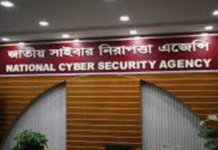Highlights:
- State, constitutional recognition of 2024 July mass uprising
- Call to honour July uprising martyrs as national heroes
- Legal protection sought for movement participants
- Push for trials of AL-era crimes, including enforced disappearances
- 2014, 2018, 2024 elections labeled as “farcical”
Chief Adviser Muhammad Yunus today (5 August) read out the July Declaration that aspires for state and constitutional recognition of 2024 July mass uprising.
“The people of Bangladesh express their desire that the student-people uprising of 2024 will get proper state and constitutional recognition and that the July declaration will feature in the schedule of the reformed constitution as framed by the government formed through the next national election,” reads the declaration.
“This document of declaration is written to reflect the aspirations of the people of Bangladesh at the event of the victory in the mass uprising of August 5, 2024,” Yunus said, reading out the written document.
The declaration also states “the people of Bangladesh express their desire to recognise the martyrs of the July uprising as national heroes and provide necessary legal protection to the students and people participating in the movement.”
The declaration also shed light to the fallen Awami League regime and human rights violation during that period.
“The people of Bangladesh expresses a strong desire to bring under trial crimes involving all kinds of oppression, violence and looting of state property and also crimes of enforced disappearance and murder, individual and mass killings, and crimes against humanity perpetrated by the fascist Awami League government during the sixteen year long anti-fascist agitation of the people of Bangladesh and during the July mass uprising of 2024,” states the declaration.
The document called three national elections held under Hasina rule as “farcical”.
“The Awami League government held three farcical elections [the National Assembly elections of 2014, 2018 and 2024] in order to continue to cling to power illegally, thereby depriving the people of this country from exercising their right to vote and representation.”

The declaration starts with a reference to the birth of Bangladesh through the Liberation War in 1971.
“In continuation of the historical struggle against colonialism, the people of this land rose against the deprivation and exploitation inflicted by the authoritarian Pakistani regime, and established the state of Bangladesh through a bloody liberation war following the Declaration of Independence made on 26 March, 1971 for achieving freedom.”
The declaration also mentioned the one-party “BAKSAL” government of 1975 and the reintroduction of multi-party democracy soon after.
“The post-independence Awami League government established constitutionally a one-party government named BAKSAL in place of a democratic order, the much aspired goal of independence, and thereby took away the freedom of expression and of the judiciary, in reaction to which, on November 7, 1975, there was an uprising in the army ranks and file joined by common people, and later the way was laid for reintroducing multi-party democracy, freedom of expression and of the freedom of judiciary in place of the BAKSAL system.”
The struggle against an autocratic military regime in the 1980s was also mentioned.
“In the 1980s, there was a long nine-year relentless struggle against an autocratic military regime resulting in the mass uprising of 1990, and a parliamentary democratic system was reestablished in 1991.”

Standing on the stage at the South Plaza of the National Parliament this afternoon, the chief adviser started the reading around 5:20pm after arriving at the venue to attend an event marking the July Uprising Day.
He arrived around 5:05pm and took the stage alongside other invited dignitaries, including leaders of various political parties.
Leaders present at the event include Jamaat’s Golam Parwar, NCP’s Nahid islam, Ganosanhati Andolan’s Jonayed Saky, Nagorik Oikyo’s Mahmudur Rahman Manna, and Gono Odhikar Parishad’s Nurul Haque Nur.
The ceremony started with the national anthem and then an one-minute silence for the July martyrs.
To commemorate the July Mass Uprising Day, a day-long cultural programme has also been organised on Manik Mia Avenue in the capital.
The Manik Mia Avenue has transformed into a vibrant hub of remembrance and resolve as thousands gathered to mark the first anniversary of the July Uprising that led to the ouster of former prime minister Sheikh Hasina.
Dubbed the “36 July Celebration,” the day-long programme began this afternoon with musical performances and is set to continue into the night with cultural events, a drone show, and the much-anticipated reading of the July Declaration.









